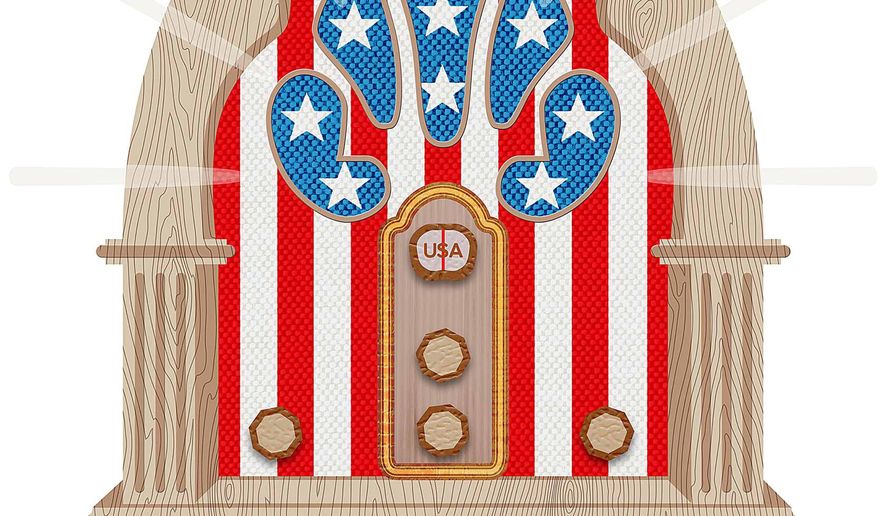OPINION:
As the economic situation in Iran continues to deteriorate due to renewed sanctions imposed by the Trump administration and protesters point fingers at the regime, the most important tool in America’s arsenal to ensure a peaceful transition to a new political order in Iran is the media.
Secretary of State Mike Pompeo alluded to this at a recent speech in Los Angeles, where he said that the Broadcasting Board of Governors (BBG) will soon launch a 24/7 Farsi-language TV station. Although President Trump and his foreign policy team are correct in offering unwavering support to the Iranian people, using taxpayer money to resurrect a moribund VOA Persian Language Service would be a big mistake; it will be like pouring good wine into a dirty bottle.
From 2004 until 2010 I was in charge of overseeing the VOA Persian language (PNN) programing into Iran. When I took over, PNN had only two live programs and few people inside Iran watched our live broadcasts. Within a year we expanded this to six hours of hard-hitting anti-regime programming. Luckily, my colleagues and I had the full support of the Bush administration to “kill the regime with facts.” Overtime, the people inside Iran trusted us to provide them with timely, unfiltered and accurate news. By 2008, we had a weekly viewership of more than 22 million.
The core of our mission was to show the Iranian people the opportunity cost of the Islamic regime to their economic well-being and national pride. As such, we presented documentaries on Iran’s rich history and culture as well as chronicled how power-hungry mullahs have for centuries thrown obstacles at Iran’s drive toward modernization.
Every program that we broadcast into Iran hit on a patriotic nerve that has been suppressed by the mullahs but never extinguished. For example, we invited experts who would point out how Iran, with the world’s largest reserves of natural gas, has fallen behind its much smaller neighbor Qatar in capturing market share. Showing our audience that the corrupt mullahs have cost Iran’s economy $560 billion in natural gas exports touched a raw nerve.
My colleagues and I also broke a century old taboo imposed by the clerics on Iran; namely, speaking about the persecution of religious minorities, including members of the Baha’i Faith. Nothing irked the close-minded mullahs more than giving a live forum to members of the Baha’i Faith to explain to their fellow countrymen inside Iran the peaceful tenets of their faith. In short, we rattled the mullah’s cage.
Not surprisingly, because we posed the single biggest threat to their existence, the clerical regime fought back. A few of our high-profile presenters and I were labeled as “agents of the Zionist regime” in the local Iranian press. In addition, agents of the Islamic regime who posed as “lobbyists,” claiming to represent the interests of the Iranian-American community, solicited the support of naive members of Congress to put an end to our anti-regime content.
Furthermore, we were stymied by some of our staff who had a leftist view of U.S.-Iran relations. For example, I had to constantly push back on their view that Iran was a victim of American intervention in 1953. Instead, I pushed for broadcasts that told the story of how President Truman preserved Iran’s territorial integrity by threatening Russia’s Joseph Stalin, thus forcing him to pull his troops out of Iran’s province of Azerbaijan.
The greatest ally the mullahs found to shut us down turned out to be the Obama administration. Sadly and unbeknownst to us, when President Obama took office, the VOA’s senior leadership told us to tone down our anti-regime programs and even stop inviting certain guests who had become trusted analysts. Never in my journalistic career did I imagine that my colleagues and I would face censorship in the United States, but we did.
Our four-year investment into building a large following inside Iran was dismantled by the Obama administration’s misguided desire for a legacy, thus turning its back on the Iranian people. When in 2009 Iranians shouted “Obama Obama are you with us or against us,” they were hoping he would use the VOA PNN to extend America’s unequivocal support. Sadly, they were disappointed. Today, the VOA Persian Service has lost almost all its credibility.
A Plan B for the Trump foreign policy team is to support the establishment of a privately funded and operated media company whose components, including TV, radio, newspaper and social media. In communications, slogans matter. And as such the overall purpose of this new independent media company is to convey a powerful yet simple message to a proud nation: “A free and prosperous Iran.”
This new media outlet will provide hope to millions of Iranians that a better future can be in store for them. It would also provide a forum for experts to share their ideas on how to rebuild Iran. For example, experts can talk about how a free and democratic Iran can be the immediate beneficiary of investments to address critical water shortages or how Iran’s Lut Desert can be an ideal place to generate electricity from solar energy for export to its neighbors.
Mr. Trump has indicated that he hopes the Iranian people will triumph in their 39-year struggle against the mullahs. This hope can be realized by supporting an independent media outlet whose message he can relate to: “Make Iran Great Again.”
• Kambiz Mahmoudi served as deputy director of National Iranian Radio until 1979. From 2004 to 2010, he was the executive editor of the VOA’s Persian News Network.




Please read our comment policy before commenting.